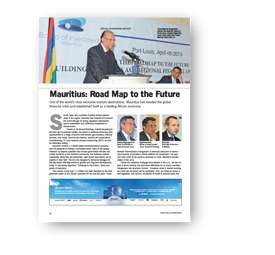“We are not pulling back on these reforms but continuing on. We
have achieved more flexibility in the labor market, and we want to
make Mauritius an international arbitration center. It’s important that
people with a dispute can resolve it quickly. Our people are bilingual
at the very least; they all speak English and French, and many speak
Mandarin and Hindi. We have a huge exclusive economic zone in the
Indian Ocean and believe that this represents our future growth sector.”
During the roundtable event, Xavier-Luc Duval, Vice-Prime Minister
of Mauritius and Minister of Finance and Economic Development,
spoke about the government’s vision of making Mauritius a hub for
business, education and logistics. A new state-of-the-art airport is
under construction that will provide aircraft maintenance and aeronautical
services, while the main seaport is set to have a $200 million
overhaul within the next few years.
“Our port provides a very safe, quick and efficient transshipment
service at the moment: however, the extra investment will mean that
we can take the largest types of container ships,” Duval says. “We
have a major road decongestion program under way and are building a
dam to improve the water supply.
“The demand for electricity continues to rise, and we plan to build
a 100-megawatt electrical generating plant over the new few years.
Mauritius is at the heart of what we call the Golden Triangle. We are
linked to the Middle East in the north, Asia to the east and then Africa.
We are ideally situated and aligned with global prosperity and wealth.”
Mauritius: Road Map to the Future - Page 2
“Mauritians are working hard to tell their success stories.”
The minister also oversees the Board of Investment (BOI), which
plays a key role in spearheading Mauritius’ efforts in promoting foreign
direct investment (FDI) and foreign trade. Whether it is information,
site visits, business networking or interaction with government
authorities, BOI, with its dedicated professional staff led by CEO Ken
Poonoosamy, offers a wide range of solution-oriented investment and
trade promotion, plus facilitation services to investors and entrepreneurs
around the world.
The country’s financial services sector, known for its transparency,
is also going from strength to strength. The Financial Services
Commission (FSC) has reviewed its framework to be more efficient and
service-oriented and has strengthened its regulatory oversight through
prudential regulation. As FSC Chairman Marc Hein said at the event:
“We want to be an internationally recognized financial supervisor
committed to the sustained development of Mauritius as a sound and
competitive financial services center. A report undertaken by Professor
Sharman, ‘Shell Companies—Launderers Anonymous,’ found that
‘in terms of following international Know Your Customer standards
on company formation, Mauritius applies the rules more effectively
than the average IFC and far more effectively than the average OECD
country...As such, Mauritius’ score of 28 compares very favorably with
countries like the United States, which got 10.9.’”
The go-getting country is also positioning itself to become an international
higher-education hub. At the roundtable event, Rajeshwar Jeetah,
Minister of Tertiary Education, Science, Research and Technology,
explained how the talent pool of Mauritius gives it a competitive edge.
“Leveraging its tradition of excellence, stability and pleasant living
environment, Mauritius holds the trump card to becoming the new
regional base for world-class educational services,” he said.
The country has an excellent record on education in general; free
education was introduced in 1976 up to the tertiary level, and that
has allowed the country the competitive edge it has now. The literacy
rate of those between 15 and 24 is 95.4%. Universities from the U.S.,
India and the U.K. are setting up campuses in the country, and it is
certainly something that can be built on.
Nick Leake, the British High Commissioner in Mauritius, adds:
“Mauritius is a great place to do business, and the Mauritians are
working hard to tell their success stories. The reputation as a tourist
paradise can make serious businesspeople hesitate before coming
here, but of those that do take a look, many stay to trade with or invest
in Mauritius. If the country can succeed in telling a parallel narrative
about business opportunity, it could make its ambition as a services
hub a reality.”

